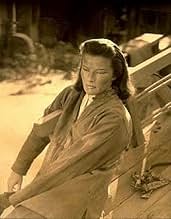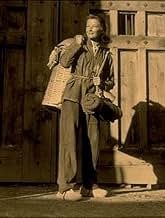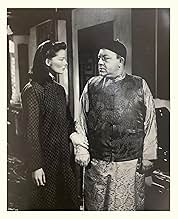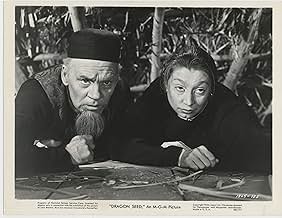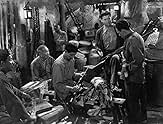IMDb रेटिंग
5.9/10
1.4 हज़ार
आपकी रेटिंग
एक छोटे से चीनी गाँव का जीवन उल्टा हो जाता है जब जापानी उस पर आक्रमण करते हैं।एक छोटे से चीनी गाँव का जीवन उल्टा हो जाता है जब जापानी उस पर आक्रमण करते हैं।एक छोटे से चीनी गाँव का जीवन उल्टा हो जाता है जब जापानी उस पर आक्रमण करते हैं।
- निर्देशक
- लेखक
- स्टार
- 2 ऑस्कर के लिए नामांकित
- 3 जीत और कुल 2 नामांकन
Philip Ahn
- Leader of City People
- (बिना क्रेडिट के)
Albert Baldo
- Japanese Soldier
- (बिना क्रेडिट के)
फ़ीचर्ड समीक्षाएं
Those who know little of the invasion of China by the Japanese Imperialist Forces during World War Two can discover general ideas surrounding this period of world history. Granted, the film is somewhat melodramatic in places, and, yes, Westerners made up to look Chinese is somewhat disconcerting as one begins to view this film. Yet, as the film progresses one is soon so overpowered by the action of the film that these minor distractions quickly evaporate. In fact, one soon accepts Katherine Hepburn as Chinese and the true drama dominates the film. The basic theme of the film is the repelling of aggressive forces in one's homeland, a not uncommon theme for 1944. Jade (Hepburn) must not only battle the invaders, she must confront traditional Chinese family values. Both conflicts are challenging to a peaceful rural village about to clash with the changes of the twentieth century. As the film progresses, the agony of family fracture and the immensely powerful drama of the last few scenes turn this film into a sober reminder of the mutability which comes with war. Hepburn is very good in this movie, as is almost all the supporting cast. The "kitchen scene" may be one of the most suspenseful of the World War Two period films. Viewers are reminded that the war between Japan and China began in 1937, four years before United States involvement.
Enjoyed the great acting by the entire cast and especially Katharine Hepburn, who plays the role as Jade Tan who lives with her family on a farm and everything is very peaceful and happy for years. However, when the Japanese evade China these peaceful times turn into a complete disaster for the farming community. Walter Houston, (Ling Tan) plays the role as father and his wife Ling Tan, (Aline MacMahan) both give great supporting roles. Akim Tamiroff, (Lu Lien) becomes friends with the Japanese and is really a traitor to his Chinese family. The Japanese treated the people very poorly and their was rape and constant killing of innocent people. This story reminded me of a book entitled, "The Rape of Nanking by Iris Chang" which talks about the horrors that Japanese soldiers performed against innocent Chinese people which is told in this picture.
I was lucky to have watched this movie with my girlfriend's father, who is Chinese. Although he didn't understand a word, he LOVED IT! He was part of the original communist movement and could totally relate to the scenes of farmers taking up arms and meeting in the mountains to plan the fight against the Japanese invaders.
He wondered why, despite the fact that the budding commies in the movie were portrayed as very heroic, he'd never heard of this movie in China. Here is an American movie that glorifies his struggles - that was produced at a time when he was told to completely shun everything Western. Made him think a little, I bet.
Oh, and by the way, don't listen to what anybody else says about the white actors playing Chinese in this movie... it's almost painful to watch!
He wondered why, despite the fact that the budding commies in the movie were portrayed as very heroic, he'd never heard of this movie in China. Here is an American movie that glorifies his struggles - that was produced at a time when he was told to completely shun everything Western. Made him think a little, I bet.
Oh, and by the way, don't listen to what anybody else says about the white actors playing Chinese in this movie... it's almost painful to watch!
Dragonseed is a whole lot like that other far better film of a Pearl Buck novel, The Good Earth. Since both came from the MGM studio the two films have the same look to them and in many ways this is another generation of the family depicted in The Good Earth facing new problems of the Japanese invasion.
Of course if it were made today, you'd be casting all oriental players in the roles. But in The Good Earth, both Paul Muni and Luise Rainer were well suited to ethnic roles. A lot of the members of the cast of Dragonseed were not.
Walter Huston at least to his credit never tried an accent in playing a Russian in North Star or a Norwegian in Edge of Darkness also films about resistance to Axis invaders. He's once again the voice of reason, driven to do unreasonable things against his nature by war. Still he doesn't come across as Chinese. Neither does Henry Travers as his scholarly cousin.
But most of all Katherine Hepburn just doesn't make it as an oriental. When Luise Rainer played Olan, the part was written with minimal dialog and she won that Best Actress Oscar for her facial expressions which said more than pages of words. Hepburn unfortunately sounds like the peasant from Bryn Mawr.
Seeing real oriental players in smaller parts like Philip Ahn and Benson Fong only draw attention to how ridiculous some of the occidentals look.
It's not a bad story, maybe it would have been better if they cast Anna May Wong though.
Of course if it were made today, you'd be casting all oriental players in the roles. But in The Good Earth, both Paul Muni and Luise Rainer were well suited to ethnic roles. A lot of the members of the cast of Dragonseed were not.
Walter Huston at least to his credit never tried an accent in playing a Russian in North Star or a Norwegian in Edge of Darkness also films about resistance to Axis invaders. He's once again the voice of reason, driven to do unreasonable things against his nature by war. Still he doesn't come across as Chinese. Neither does Henry Travers as his scholarly cousin.
But most of all Katherine Hepburn just doesn't make it as an oriental. When Luise Rainer played Olan, the part was written with minimal dialog and she won that Best Actress Oscar for her facial expressions which said more than pages of words. Hepburn unfortunately sounds like the peasant from Bryn Mawr.
Seeing real oriental players in smaller parts like Philip Ahn and Benson Fong only draw attention to how ridiculous some of the occidentals look.
It's not a bad story, maybe it would have been better if they cast Anna May Wong though.
Pearl Buck's novel "Dragon Seed" was made into a film in 1944. Back then, for reasons known only to themselves, the studios did not cast Chinese to play Chinese in major roles. Looking at the film now, I guess it's important to remember that to the 1944 audiences, there was nothing unusual about this.
Taking the non-Chinese casting out of the equation for just a moment, "The Dragon Seed" is a powerful story of what happened to the Chinese during the barbaric occupation of the Japanese.
The story focuses on the family of Ling Tan (Walter Huston), his wife (Aline McMahon), and his sons, Lao Er Tan (Turhan Bey) and wife Jade (Katharine Hepburn), Lao San Tan (Hurd Hatfield) and Lao Ta Tan (Robert Bice).
Jade is a modern thinker, and part of the story deals with the struggles between the new times and old traditions and the role of women. The other part of the story is how various people deal with the occupation. There is submissiveness, resistance, and collaboration.
I'm most moved by a review on this site by a man who has a Chinese father-in-law. His father-in-law loved the film. No one in China knew that America was on their side; they were taught to hate the western world.
So if a Chinese man can overlook the casting, I suppose I can too, but I can't. The acting is fantastic, but one wonders what was wrong with Anna May Wong, Keye Luke, Sen Yung, and why only the extras and children seemed to be at the very least Asian.
For me the most egregious casting was that of Katharine Hepburn. Her acting came alive in the second part of the film. She once said that Spencer Tracy made her seem very feminine. He's not in this movie.
In the beginning, in the love scenes with her husband, it doesn't come off. She's better when the character shows strength. Her finishing school accent and wig don't cut it either. Very difficult to watch. Also, she seems oddly matched with Turhan Bey.
This film is still well worth seeing. It's very dramatic and emotional, with a very big and poignant ending.
Taking the non-Chinese casting out of the equation for just a moment, "The Dragon Seed" is a powerful story of what happened to the Chinese during the barbaric occupation of the Japanese.
The story focuses on the family of Ling Tan (Walter Huston), his wife (Aline McMahon), and his sons, Lao Er Tan (Turhan Bey) and wife Jade (Katharine Hepburn), Lao San Tan (Hurd Hatfield) and Lao Ta Tan (Robert Bice).
Jade is a modern thinker, and part of the story deals with the struggles between the new times and old traditions and the role of women. The other part of the story is how various people deal with the occupation. There is submissiveness, resistance, and collaboration.
I'm most moved by a review on this site by a man who has a Chinese father-in-law. His father-in-law loved the film. No one in China knew that America was on their side; they were taught to hate the western world.
So if a Chinese man can overlook the casting, I suppose I can too, but I can't. The acting is fantastic, but one wonders what was wrong with Anna May Wong, Keye Luke, Sen Yung, and why only the extras and children seemed to be at the very least Asian.
For me the most egregious casting was that of Katharine Hepburn. Her acting came alive in the second part of the film. She once said that Spencer Tracy made her seem very feminine. He's not in this movie.
In the beginning, in the love scenes with her husband, it doesn't come off. She's better when the character shows strength. Her finishing school accent and wig don't cut it either. Very difficult to watch. Also, she seems oddly matched with Turhan Bey.
This film is still well worth seeing. It's very dramatic and emotional, with a very big and poignant ending.
क्या आपको पता है
- ट्रिवियाFilmed in 1943 on the MGM lot in Culver City, CA, the film features an unusual assortment of non-Asian actors with odd accents playing Chinese and Japanese: Russian-born and Stanislavski-trained Akim Tamiroff as Wu Lien; Turhan Bey, Viennese born son of a Turkish father and Czechoslovakian mother as the middle son, Lao Er Tan; New England patrician Katharine Hepburn as his wife; American Aline MacMahon--no longer one of the wisecracking Gold Diggers of 1933 (1933)--as the wife of Ling Tang; English-born Henry Travers (best remembered as Clarence the Angel from Yeh ek Adbhut Jeevan Hai (1946)) as the Third Cousin"; Irish-American J. Carrol Naish as the Japanese Kitchen Overseer; and finally Jewish Robert Lewis, co-founder of the Actors Studio and Meryl Streep's teacher at the Yale Drama School, as Japanese Capt. Sato.
- कनेक्शनEdited from The Good Earth (1937)
टॉप पसंद
रेटिंग देने के लिए साइन-इन करें और वैयक्तिकृत सुझावों के लिए वॉचलिस्ट करें
- How long is Dragon Seed?Alexa द्वारा संचालित
विवरण
बॉक्स ऑफ़िस
- बजट
- $30,00,000(अनुमानित)
- चलने की अवधि
- 2 घं 28 मि(148 min)
- पक्ष अनुपात
- 1.37 : 1
इस पेज में योगदान दें
किसी बदलाव का सुझाव दें या अनुपलब्ध कॉन्टेंट जोड़ें



